The 'one-in-a-million' denied a glowing future
- Published
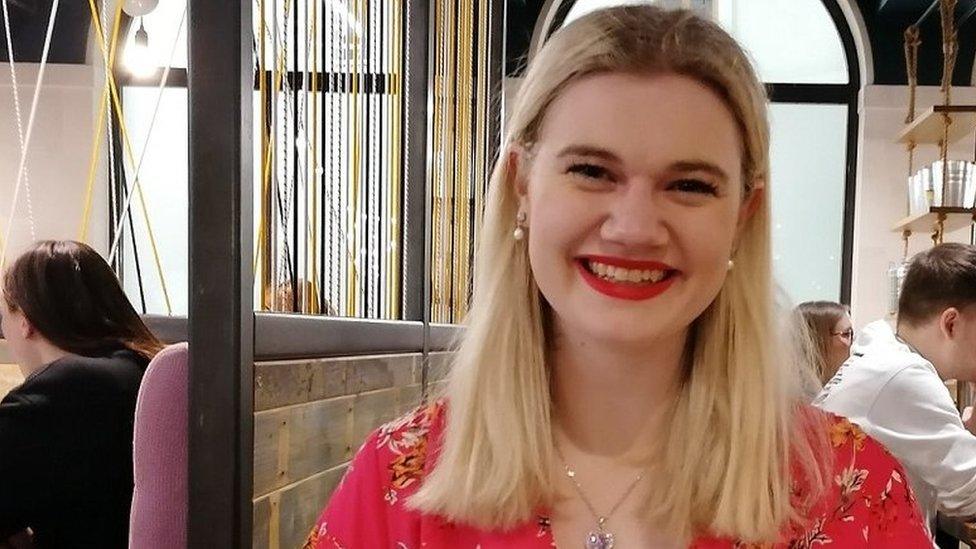
Megan Newborough's family said she "was the most generous, loving and caring person"
At the time she was brutally murdered by her boyfriend, Megan Newborough's family said her life had appeared to be taking off.
The popular and outgoing young woman was part of a loving and close-knit family, she was highly regarded in her career and she was preparing to pick up the keys to her new home, having secured a mortgage.
Colleagues at the Ibstock Brick Factory, in Leicestershire, where she worked in human resources, described her as "a one-in-a-million type of person".
"Even on bad days she was never without a smile," said fellow human resources worker Lucy Weighall.
"She had a way of never looking at the bad side of people. She would always find the positives."
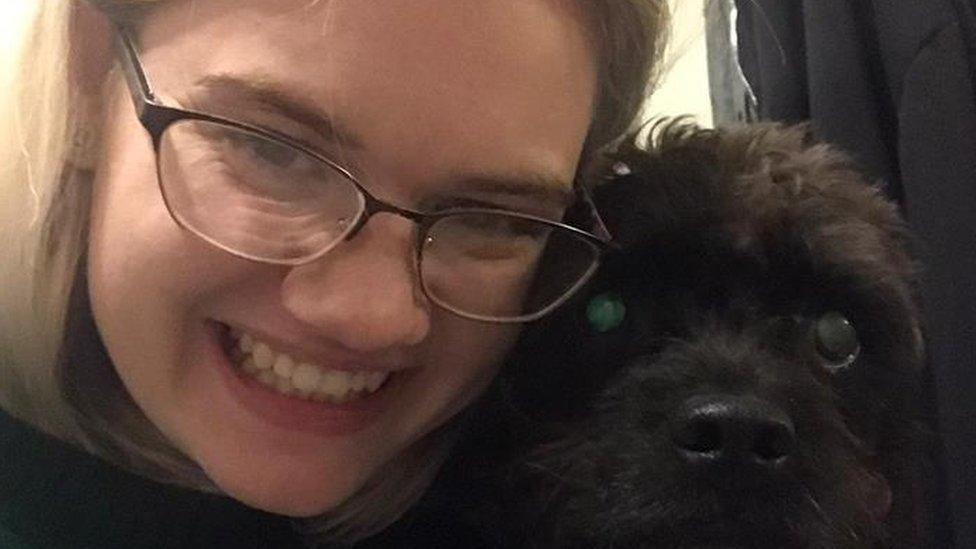
Megan loved animals - particularly her pet dog Frank
She was known as caring and responsible, a keen dancer and a dog lover, being particularly devoted to her pet dog Frank.
But, to the surprise of many of those who knew her, Megan became involved in an unlikely relationship with a shy, introverted colleague - a lab technician by the name of Ross McCullam.
Megan was six days short of her 24th birthday when - on the night of Friday 6 August, 2021 - McCullam, 30, invited her to his family home at Windsor Close, Coalville, choosing a time when his parents were out.
There he strangled her, before slashing her throat 14 times with a kitchen knife, in what the prosecution suggested was an attempt to behead her.

Police said Megan was a warm, lovely, caring individual who wanted nothing but the best for Ross McCullam
Following a six-week trial, it took a jury at Leicester Crown Court just 90 minutes to convict McCullam of Megan's murder. He was sentenced to a minimum of 23 years in prison on Friday.
How did the relationship come to such a shocking and brutal end?
Before the trial, McCullam had admitted Megan's manslaughter.
However, he claimed he had lost control of his actions in a "blind rage" after suffering an incident of post-traumatic stress disorder (PTSD) triggered by sexual abuse he had suffered as a child at the hands of older children.

McCullam's mother said he was a loner who would keep to his filthy bedroom - where he was arrested after Megan's disappearance
His version of events was rapidly discounted by the jury.
Judge Philip Head said he could not be sure McCullam had not invented the abuse telling him, at sentencing: "I am sure you have tried to manipulate mental health evidence to avoid conviction for murder."
He praised Megan's family for their dignity, sitting through every minute of the trial and listening to details he described as "beyond bearing".
He said Megan had had a "glowing future" telling McCullam: "It was her dreadful misfortune to become involved in a relationship with you."
In addition, McCullam's own family gave evidence against him during the trial.
His mother Linda said he was a loner, who had left school at 16 with no qualifications and had struggled to hold down jobs.
The trial heard McCullam had largely kept to his filthy, litter-strewn bedroom when his mother and father Gary were at home.
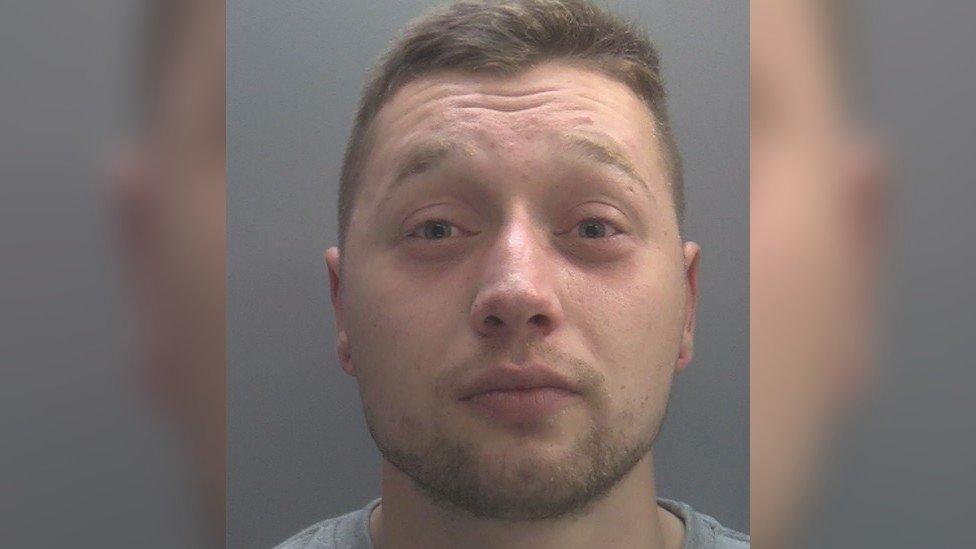
Police described McCullam as a monster who was capable of killing again
There he would drink large volumes of coke, smoke, play video games and watch pornography.
McCullam, according to his parents, had made very little effort to find a girlfriend.
They said they were stunned when he revealed he was in a relationship "with a girl called Meg" from work.
They said they hoped the relationship might be good for their son.
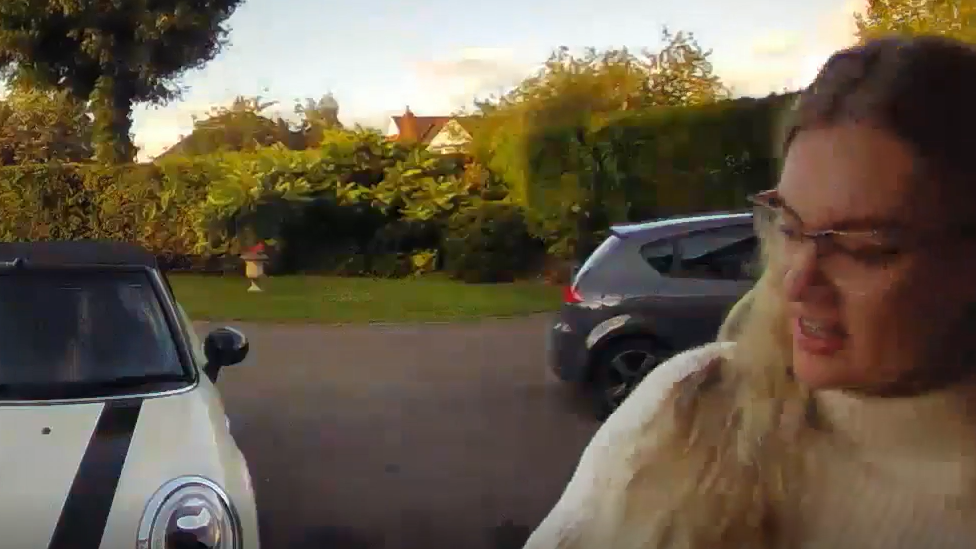
A doorbell camera captures the moment Megan left her home in Nuneaton for the last time to visit McCullam
Megan's parents, Anthony and Elaine, said, during the trial, they had not been unduly concerned about the relationship.
Their daughter had described McCullam as "a gentleman".
Mr Newborough said: "The way she spoke about Ross, it was as if she had a twinkle in her eye.
"She was quite taken with him."
Megan had not told them about her new relationship in too much detail and they said they had not wanted to press her for information.
On the night she died, Megan had told her parents she would be home by 23:00 BST.
Footage from a doorbell camera shows her leaving home for the very last time.
WhatsApp messages and GPS data shows Megan arriving at McCullam's home at just after 20:00.
At some point in the next 50 minutes, he murdered her.

Megan's family said they became alarmed when she failed to return home and did not respond to their messages
What happened next was that McCullam embarked upon an elaborate series of lies and actions to try to cover up what he had done.
He cleaned up the blood in the living room - later telling his parents a damp patch on the carpet was where he had spilled a drink - then bundled Megan's body into the passenger side of her own Citroen C3.
He drove to a remote spot at Charley Road near Woodhouse Eaves, where he threw Megan's body over a stone wall into undergrowth.
By this point, McCullam had already texted Megan's phone to tell her she was amazing and had left a voicemail telling her he loved her, and he had had "a fun time", before hurling it into bushes by the roadside near his home.
The apparently tender messages were a far cry from many McCullam had sent to Megan in the days leading up to her death, which prosecutors said became increasingly inappropriate, crude and distorted, outlining his sexual fantasies.
CCTV shows McCullam then driving to a car park at Loughborough College, where he had once studied.
Here he abandoned the car and discarded both his and Megan's bloodstained clothes in nearby bins.
After that, he hailed a cab to take him home.
Police analysis of his subsequent internet browsing shows him searching for pornography, notorious serial killers including Peter Sutcliffe and details of high-security prisons.
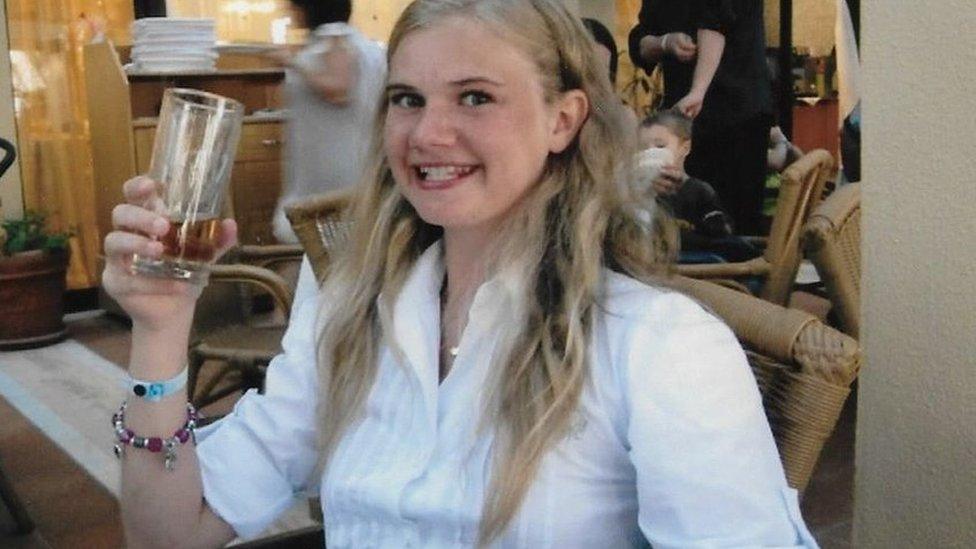
Megan's family said she was sensible and safety-conscious
Meanwhile, at Megan's home in Nuneaton, Warwickshire, her family were becoming alarmed by her failure to return home.
The following day, they reported her missing and organised a search.
They and parties of friends started driving around Loughborough in search of her car after police told them it had been picked up by ANPR cameras the night before when McCullam was at the wheel.
Megan's brother John used a phone tracking app to locate her iPhone to the spot where McCullam had thrown it. He was able to direct police officers to the area where they discovered it in a bush.
At this point, officers began treating Megan as the victim of a serious crime rather than as a missing person.
Meanwhile, McCullam was continuing to feign concern over her disappearance.
But police viewed him as the prime suspect.
The night after the murder - Saturday 7 August - he was out drinking when they arrived to search his home.
McCullam's dad rang him to tell him the police were searching for Megan and wanted to speak to him.
McCullam initially told an officer on the phone that Megan had been safe and well the night before when she had left him and that he had been trying to contact her.
But later that night, officers returned to McCullam's home and arrested him.
At this point, McCullam revealed to them Megan was dead.
He told the police where they could find her body and her car.
Officers said the spot McCullam had chosen to hide Megan's body was so remote that, had he not disclosed the location, she may not have been found for months.
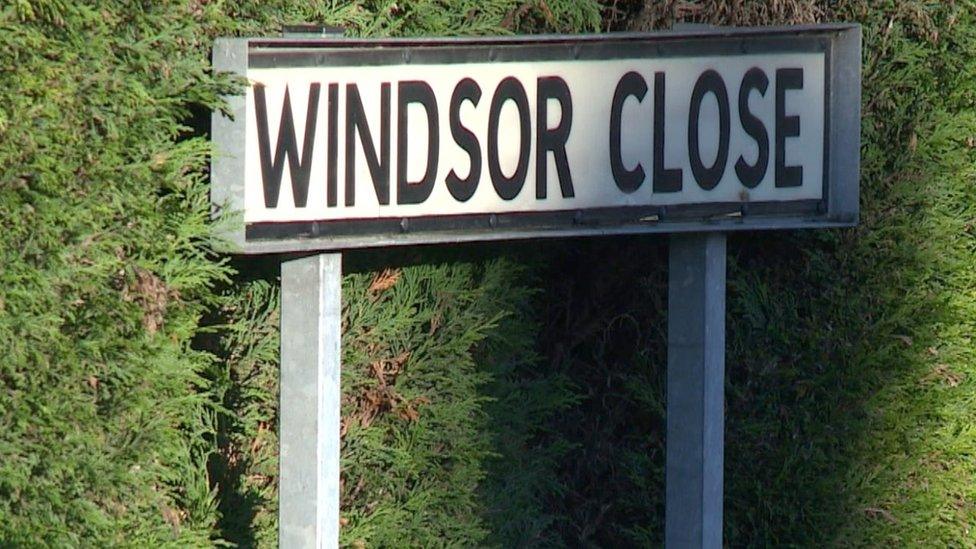
Ross McCullam lived at his parents' home on Windsor Close
What do police feel was the true motivation for McCullam's crime?
Detectives said they had never believed McCullam's PTSD defence which he began to spin almost immediately after his arrest.
Det Insp Jenni Heggs of Leicestershire Police, who led the investigation, said McCullam was "a monster" whose crime had been calculated.
"I genuinely believe, having investigated this from the offset, that Ross enjoyed killing Megan," she said.
"I think it excited him and I genuinely believe he had the potential to kill again.
"His actions afterwards certainly didn't show any remorse.
"That defence is something we have never bought into or believed and thankfully the jury have seen through that too.
"He's a dangerous person who had the potential to kill again.
"He is a monster. He is a wolf in sheep's clothing and the streets are safer without McCullam."
She added that the investigation had served to tell Megan's friends and family what they already knew about her - that she had tried to help her boyfriend, as she had so many others in her life.
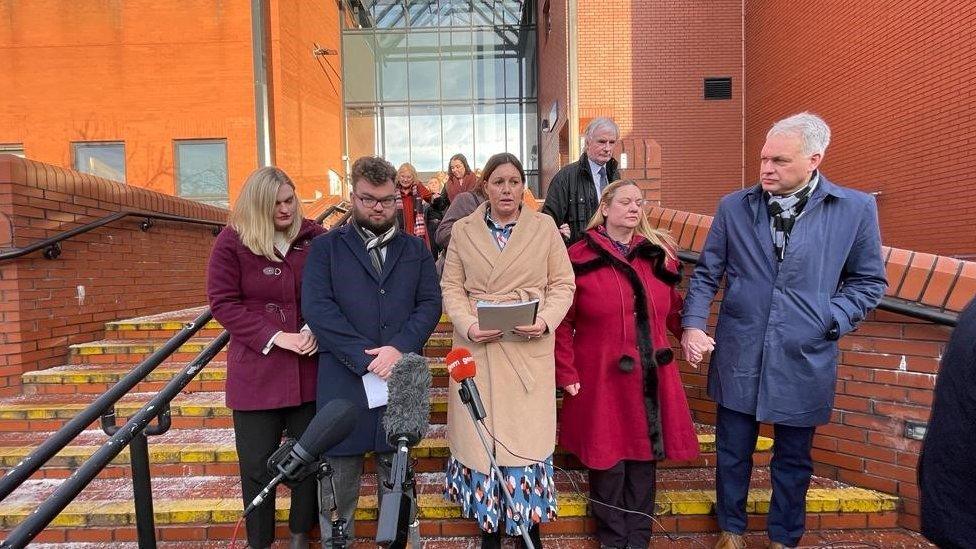
Det Insp Jenni Heggs, with the Newborough family outside Leicester Crown Court, said McCullam was "a monster"
Police said McCullam had also told her he had been abused as a child.
Megan's messages show how she urged him to seek help and speak to his family.
Prosecutors said she showed him nothing but "gentle assurance".
"Megan has come across through the investigation as a warm, lovely, caring individual who wanted nothing but the best for Ross and to help him with some of his demons," Det Insp Heggs said.
"It must have been absolutely horrendous for Megan's family to hear the intimate, graphic detail of how Ross killed their daughter.
"My view is that he was absolutely in control of what he was doing."

Follow BBC East Midlands on Facebook, external, Twitter, external, or Instagram, external. Send your story ideas to eastmidsnews@bbc.co.uk, external.
Related topics
- Published12 December 2022

- Published4 December 2022
